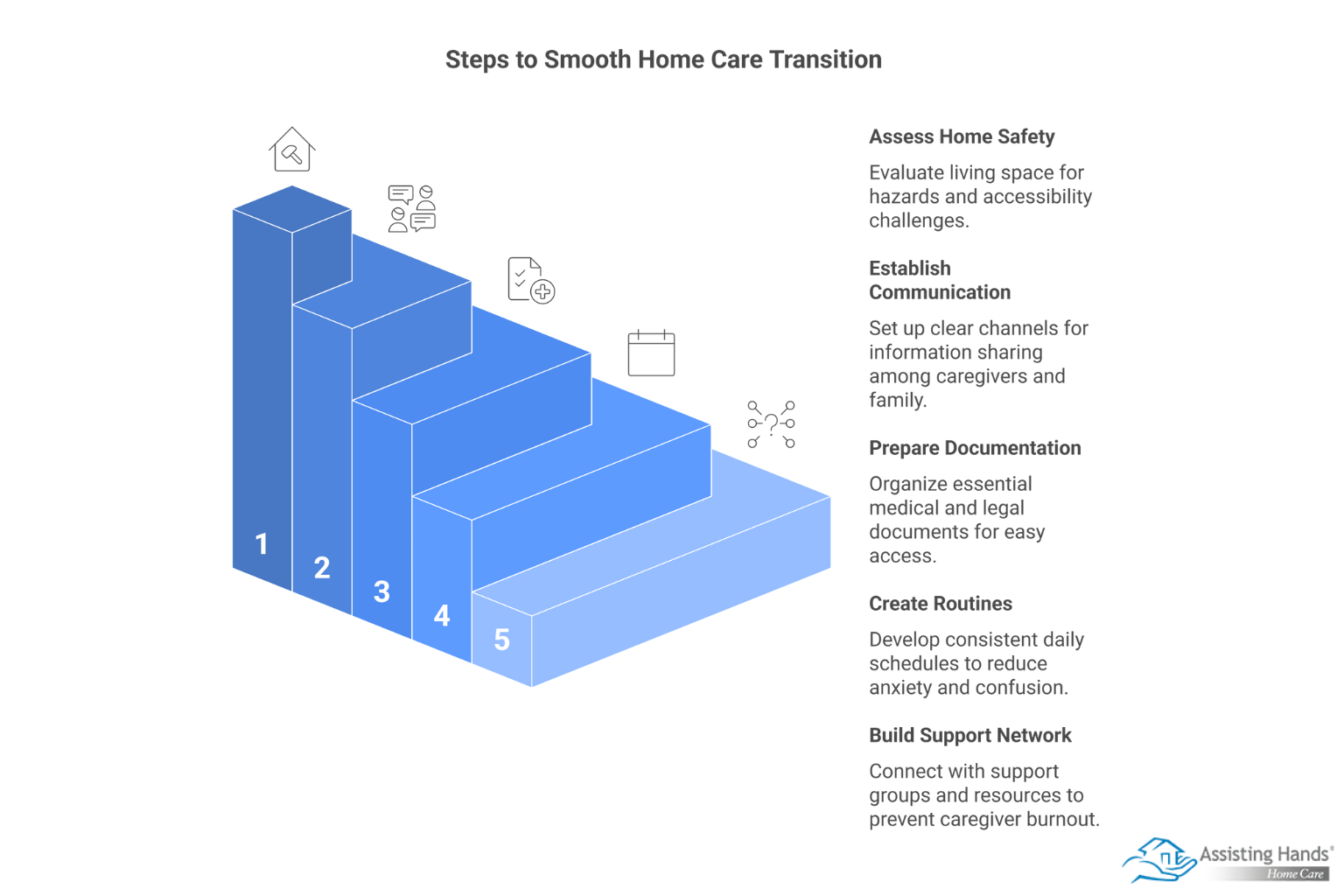
Table of Content
Starting home care represents a significant change for both seniors and their families. This transition requires thoughtful planning and preparation to ensure comfort, safety, and peace of mind for everyone involved.
Assess Your Home Environment for Safety and Accessibility
Before home care begins, conduct a thorough evaluation of your living space to identify potential hazards and accessibility challenges. This proactive approach can prevent accidents and creates a more comfortable environment for both you and your senior loved one.
Key areas to address include:
- Installing grab bars in bathrooms and along hallways
- Removing loose rugs or securing them with nonslip backing
- Ensuring adequate lighting throughout the home, especially in stairways and bathrooms
- Clearing walkways of clutter and obstacles
- Checking that handrails are secure and at appropriate heights
- Considering ramps or other modifications for wheelchair or walker access
Pay special attention to the bedroom where your loved one will spend significant time. Ensure the bed is at an appropriate height for safe transfers, and keep essential items within easy reach. Good lighting and clear pathways to the bathroom are particularly important for nighttime safety.
One of the most challenging tasks of helping an elderly relative age in place safely and comfortably is researching agencies that provide at-home care. Cincinnati families can turn to Assisting Hands Home Care for reliable, high-quality in-home care for aging adults. We offer 24-hour care for seniors who require extensive assistance, and we also offer respite care for family caregivers who need a break from their caregiving duties.

Establish Clear Communication Channels
Effective communication forms the foundation of successful home care relationships. Establishing clear channels for information sharing ensures everyone involved understands expectations, schedules, and any changes in care needs.
Set up communication systems that include:
- A shared notebook or digital app where caregivers can document daily activities and observations
- Emergency contact lists posted in easily visible locations
- Regular check-in schedules with family members and healthcare providers
- Clear instructions for medication organization and meal preferences
- Contact information for your loved one’s doctors, pharmacy, and other healthcare professionals
Consider appointing one family member as the primary contact to streamline communication and avoid confusion. This person can serve as the main liaison between the care team and other family members, ensuring everyone stays informed about important updates or changes.
Prepare Essential Documentation and Medical Information
Organizing important documents and medical information before care begins saves time and reduces stress during emergencies. Having this information readily available helps you make informed decisions and coordinate with healthcare providers when needed.
Gather and organize the following materials:
- Current medication lists with dosages and administration times
- Medical history, including diagnoses, allergies, and previous hospitalizations
- Insurance information and identification cards
- Healthcare provider contact information and appointment schedules
- Legal documents such as power of attorney and advance directives
- Preferred hospital and emergency contact information
Keep copies of essential documents in an easily accessible location and provide professional caregivers with relevant information they need to perform their duties effectively. Consider creating a medical binder that can accompany your loved one to appointments or hospital visits.
Create Comfortable Daily Routines
Establishing predictable daily routines can reduce anxiety and confusion, particularly for patients with cognitive challenges like dementia. Consistent schedules provide structure and security while allowing flexibility for individual preferences and needs.
Develop routines that incorporate:
- Regular mealtimes with preferred foods and dietary requirements
- Medication schedules that align with daily activities
- Personal care activities like bathing and grooming
- Physical activity appropriate for your loved one’s mobility level
- Social activities and mental stimulation through conversation, music, or hobbies
- Rest periods and sleep schedules that promote good health
Share these routines with caregivers and be open to adjustments as you learn what works best. Some seniors may need time to adapt to new schedules, so patience and flexibility during the initial transition period are essential.
If your elderly loved one needs help maintaining a high quality of life while aging in place, reach out to Assisting Hands Home Care, a trusted provider of senior home care. Our caregivers provide transportation to and from medical appointments and social events, nutritious meal preparation, assistance with daily exercise, and help with everyday tasks like bathing, grooming, and light housekeeping.
Build Your Support Network Early
Starting home care affects the entire family, not just your loved one. Building a strong support network before care begins helps everyone adjust to new roles and responsibilities while preventing caregiver burnout among family members.
Strengthen your support system by:
- Connecting with local caregiver support groups for practical advice and emotional support
- Identifying family members and friends who can provide respite care or assistance
- Researching community resources like adult day programs or transportation services
- Establishing relationships with healthcare providers who specialize in home care
- Joining online communities where you can share experiences with other families
- Exploring financial resources and insurance benefits available for home care services
Accepting help from others allows you to provide better care for your loved one in the long term. Building these connections early creates a safety net that supports both your loved one and the entire family throughout the home care journey.
Whether you need respite from your caregiving duties or your aging loved one needs live-in care, Cincinnati, OH, Assisting Hands Home Care can meet your family’s care needs. Our dedicated caregivers are available around the clock to provide transportation to doctor’s appointments, ensure seniors take their prescribed medications, and help with a variety of tasks in and outside the home. To learn about our high-quality in-home care plans, call us today.







